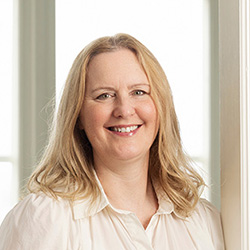The economy heading in the right direction

"We have come through the worst cost crisis and can now see the light at the end of the tunnel."
This is what Anders Söderholm, President of KTH, says about KTH's recently adopted budget, which shows a cautiously positive development.
Even if KTH shows a negative result for 2024, things are moving in the right direction towards balanced finances. The deficit for 2024 of SEK 105 million is better than the result for 2023, when KTH made a loss of SEK 258 million. The austerity measures have mainly affected undergraduate education and have led to a small surplus in education.
According to Chief Financial Officer Susanne Odung, the forecast in the recently adopted budget for this year shows a surplus of SEK 14 million this year.
"For the following years, 2026-2028, the forecasts show continued small surpluses and deficits, which may also be affected by the outcome of the Research and Innovation Act," Odung says.
Inflation and high rents
Part of the background to the hard-hit economy has to do with inflation, the sharp rise in rents for premises and the fact that KTH has for a number of years not delivered the volume of education that the government has assigned to it, i.e. has not worked up the so-called funding cap. In recent years, therefore, a number of decisions and measures have been taken to strengthen KTH's finances in various ways.

Optimisation of premises, increased education programmes, more research applications, more energy efficiency and continued reduction of the university administration´s budget and streamlining of the adminstrative organisation , as well as more frequent financial reconciliations are some of the things that have been done.
"We have worked to reduce costs and increase income and have made conscious investments through the agencys's capital. All employees have made a real effort and contributed in different ways, so I would like to take this opportunity to thank you for the work we have done together to strengthen our finances," Söderholm says.
"A lot of work to be done"
The budget document, which was approved by the University Board on 19 February, contains a forecast for the coming years 2026-2028 and a number of proposals to the government concerning education, research, research infrastructure and premises. The budget document also includes a new model for the rental of premises by Akademiska Hus, where the profits are returned to the educational centres, the return requirements for Akademiska Hus are removed and instead they are given a social mission to counteract the high rents resulting from the current market rent setting.
Other proposals include a freer position for universities to strengthen academic freedom in various ways, higher basic funding for research in relation to external funding, and fewer requirements for co-financing from state funding bodies.
" There's still a lot of work to be done, and it's important that we continue to persevere in order to develop into the university KTH wants to be in the long term. Given the global situation and some concerns about inflation, we're skating on thin ice, but overall it still looks good at the moment," says Anders Söderholm.
The budget document (in Swedish) is set by the University Board and includes the income and expenditure of the organisation for the next three years, as well as strategic challenges. It is sent to the government once a year. The annual report for 2024 reports the previous year's results etc. This is also approved by the KTH Board.
Text: Jill Klackenberg
